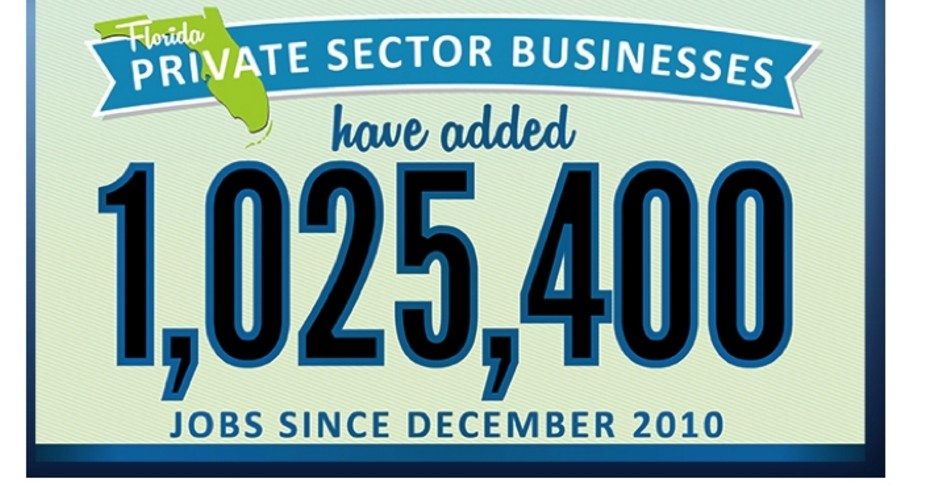
Almost immediately upon assuming Florida’s governorship in January, 2011, Rick Scott started cutting. He increased the state’s exemption level for corporate taxes from $25,000 to $50,000. He expanded the state sales tax exemption for manufacturing equipment. In 2013, he approved a three-year total exemption of that sales tax. In 2014, he pushed to raise the corporate tax exemption from $50,000 to $75,000. Last year he signed into law a $400 million cut in vehicle fees. In all, over the past five years he, with the help of a friendly legislature, has cut nearly 50 taxes.
Along the way he has cut business regulations by 15 percent, from 21,000 to 17,800, while also eliminating almost 11,000 government jobs (with another 1,000 cuts in the pipeline). In addition he reduced the number of weeks and the benefits payouts under the state’s unemployment insurance program.
The results were felt within a year. In 2013, and then again in 2014, Florida’s economy outpaced the national economy, with its growth putting it 11th in the country in 2014. The Tax Foundation ranked Florida 5th in the country in its State Business Tax Climate in 2012, 2013, and 2014; and then moved it up to 4th position in 2015.
The rebound is reflected in more than one million new jobs being added since Scott took office, passing Texas in job creation and New York in population. It’s reflected further by Bloomberg, which named 18 cities that are expected to see the most growth next year, nine of which are in Florida. It is also reflected in tax revenues to the state, which Scott projects will result in a $635 million surplus for 2016-2017.
All of which is predictable, according to Timothy Doescher, a research assistant at the Heritage Foundation: “What is the model set by Florida? It’s simple: Get government out of the way, and unleash prosperity.”
Governor Scott has a pro-business background, founding a private, for-profit healthcare company, Columbia Hospital Corporation, at age 34. Two years later his company merged with the Hospital Corporation of America (HCA), to become Columbia/HCA. In less than 10 years, it became the largest privately owned healthcare company in the country.
He also managed to keep his honor intact when Columbia/HCA was charged with defrauding Medicare, and agreed to pay more than $600 million in fines in 1997. Scott was not implicated, and no charges were filed against him.
Upon leaving the company, Scott became a venture capitalist, investing in high-risk, potentially high-return companies. In 2009 Scott founded Conservatives for Patients’ Rights (CPR) offering a free-market alternative to President Obama’s healthcare plan, supporting what he called “choice, competition, accountability and personal responsibility.”
What’s remarkable is that when Scott became governor of Florida, unemployment was above 11 percent, 900,000 jobs had been lost during the recession, and the previous administration had added some $5 billion in debt. By allowing the free market to breathe, Scott’s administration put in place the recovery now being enjoyed by Floridians (whose number is increasing by 1,000 people every day arriving from other states).
A graduate of an Ivy League school and a former investment advisor, Bob is a regular contributor to The New American magazine and blogs frequently at LightFromTheRight.com, primarily on economics and politics. He can be reached at [email protected].



